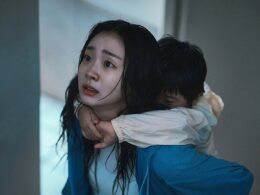Edited by Seo Hae Lan
Translated by Kim Hoyeun

The Netflix original series Juvenile Justice highlighted the reality of today’s juvenile crime in Korea from various angles. And with that, the show captured the hearts of those concerned about the topic, even beyond Korea. By examining not only the causes of juvenile crime but also what comes after the punishment of these young offenders, the show broadens our perspectives that extend only in two directions, punishment and reformation, to the “next.”
Juvenile Justice begins when Judge Shim Eun Seok (Kim Hye Soo), who openly says that she hates juvenile offenders, is appointed to the juvenile department of the Yeonhwa District Court. To Judge Kang Won Joong (Lee Sung Min), who seeks realistic solutions, and fellow judge Cha Tae Joo (Kim Mu Yeol), who are compassionate to juvenile offenders, Shim argues that they need to show “how scary the law is” to those kids who don’t realize that their actions come with responsibilities. In the courtroom, Shim sharply criticizes the young offenders that their actions were wrong and that what they did was a crime. She also stresses the responsibility of not only the kids that committed the crime but also the responsibility of adults that need to protect and educate them. Actions come with responsibility and crimes need to be punished, yes. But she contends that adults that didn’t hold these desperate kids’ hands are also to be condemned.
The show presents various perspectives on juvenile offenders and juvenile crimes through the judges of the juvenile division. All three judges have different primary principles: Shim’s is strict punishment, Cha’s is faith and kindness, and Kang’s is the reformation of the young offenders. And their priorities are related to their past and present, as well as their experience as judges. Juvenile Justice combines the pain and crisis that they experienced as human beings into the storyline, showing how judges that know the law best and are confident that they are the fairest can become powerless in front of the law.
https://www.youtube.com/watch?v=QBLViilJIHg
Juvenile Justice goes beyond the anger and question, “Why aren’t juvenile offenders getting the proper punishment?” This includes all things we wondered about or hadn’t thought of, such as how young offenders live after being punished, get opportunities for reflection and recovery, and why they fall back into crime. Viewers encounter the shocking reality of the supervision of juvenile crime through the drama. Juvenile detention centers are all crammed with young offenders and are run by the good will of some private organizations. What’s worse is that every supervisor already has too many offenders they are in charge of.
Because of these practical limitations, judges clash with different principles in handling juvenile crime cases. Kang’s replacement, Judge Na Geun Hee (Lee Jung Eun), argues that the overwhelmingly increased number of juvenile crimes must be handled quickly, which conflicts with Shim, who prioritizes checking the facts and enforcing strict punishment. However, Juvenile Justice deals with both the realistic reasons for Na’s decision and the people who have suffered tragic damage because of it, making viewers ponder over both sides of the story.
A balanced perspective that considers both the individual’s responsibility and the influence of the social environment and an attempt to expand the viewer’s rigid thinking are the biggest appeals of Juvenile Justice. And this was the result of the consonance of scripts, directing, and acting. In his first-ever drama scripts, writer Kim Min Seok three-dimensionally depicts the complex aspects of juvenile crime based on years of coverage of the court juvenile department. Director Hong Jong Chan delicately portrays the subtle nuance of the scripts and shows a directing that further animates the actors’ excellent performances.

The biggest charm of Juvenile Justice is the actors’ passionate performances. The veteran actors playing the judges or the court staff lead the overall story, and the rookie actors that play the juvenile criminals catch the viewers’ attention with their youthful energy. And at the center of them is Kim Hye Soo. Kim, who steals all attention from the moment she appears, paints out the complicated character named Shim Eun Seok, helping all her co-stars, especially the rookie actors, to perform their best. She has a proper understanding of the characters and story, which she directly delivers to the viewers. With her performance, she proves herself once again why she was called the top actress for the past 30 years. �
In recent years, more voices have been calling out for the abolition of juvenile law. And to all those that advocate harsher punishment and to those that adhere to the principle of reformation, Juvenile Justice clearly says one thing. Juvenile crime is nothing simple. If we don’t properly look at the complex reality of the juvenile, family, society, and nation, there will be kinds facing the judges in the courts even today. That’s why we need to listen carefully to the messages Juvenile Justice is sharing with this world. (9/10)
Editor Seo Hae Lan: I’m not picky and like all genres. I am in constant search of a balance between criticism and a fan’s heart.
Translator Kim Hoyeun: If you are a fan of K-drama, K-movie, and K-pop, I am your guy. I will continue to provide you with up-to-date K-entertainment news.



















